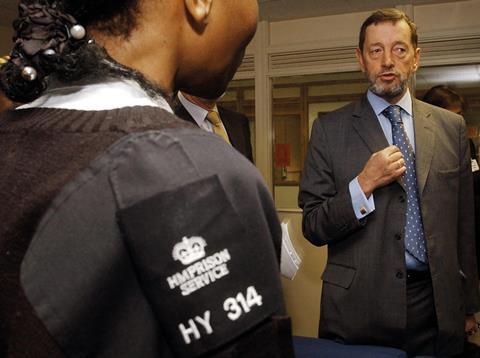Indeterminate sentences of ‘imprisonment for public protection’ are thoroughly discredited. So is the end of this manifestation of ‘state-sponsored psychological harm’ in sight at last? Catherine Baksi reports
The low down
The accumulating fallout from the Post Office Horizon scandal shows that government can move at speed to address the shortcomings of the justice system – even after years of indifference. Perhaps it really does take a TV drama. Because for more than a decade, there has been political consensus that imprisonment for public protection (IPP) sentences – indeterminate sentences designed for offenders thought to pose a significant risk of serious harm to the public – were a mistake. Not least because, with the penal system under severe strain, prisoners have not been able to access the interventions they needed to demonstrate that they were no longer a risk to society. IPP sentences were scrapped in 2012. But of those already sentenced, 2,852 are still incarcerated. Government proposals to fix the problem are modest. Can the House of Lords force the pace of change?
In 2012 a sentencing regime branded the ‘greatest stain on our criminal justice system’ was abolished. Yet 12 years on, almost 3,000 prisoners remain incarcerated even though they have served their time – many by more than a decade.
Imprisonment for public protection (IPP) – a type of indeterminate sentence – was introduced in England and Wales by the Criminal Justice Act 2003. It was scrapped by the coalition government in 2012 via the Legal Aid, Sentencing and Punishment of Offenders Act 2012, following widespread criticism.
But legislation ending IPPs was not retrospective; it did not provide for more than 6,000 IPP prisoners in custody to be resentenced and given determinate terms.
Ministry of Justice data shows that, as of 31 December 2023, there were 2,852 prisoners serving IPP sentences. Of those, 1,625 were prisoners who had been recalled; 1,227 have never been released.
More than half of those still in prison have served more than 10 years over their minimum tariff. Some have died without being freed. According to the United Group for Reform of IPP, a campaign group, 90 have taken their own lives while serving a sentence.
Recalls
Richard Garside, director of the Centre for Crime and Justice Studies, notes the rising number of prisoners recalled to prison. Last year, the number rose by 127, meaning that overall the IPP population fell by only 40.
In 2022, the government rejected calls from the Commons justice committee to resentence IPP prisoners, but last November announced changes to amend the licence element of the sentence.
At present, after IPP prisoners have been released, they remain on indefinite licence until they have satisfied the Parole Board that they are no longer a risk.
The reform, introduced in the Victims and Prisoners Bill currently going through parliament, reduces the time that released prisoners have to wait before having their licence reviewed and potentially terminated to end their sentence, from 10 to three years.
Additionally, even if the Parole Board rejects their application to terminate their licence after three years, the sentence will automatically expire after two more years, providing they are not recalled to prison in that time.
Ministers state that the change will come into force two months after the bill receives royal assent. Around 800 will become newly eligible for Parole Board consideration by March 2025.

Modest move
While campaigners and specialist prison lawyers welcome the move, it does nothing to help those still in custody, who remain without an end date.
Peers across the political spectrum are seeking to introduce wider reforms. They have tabled 17 amendments to the bill, which is currently at committee stage in the Lords.
IPP sentences were designed for offenders convicted of one or more specified serious violent or sexual offences (carrying a maximum sentence of 10 years or more), where the court considered that the offence did not merit a life sentence, but the offender posed a significant risk of serious harm to the public in the future.
The court set a minimum period in custody, known as a ‘tariff’, before the individual was eligible for parole. Once the Parole Board determined that they were no longer a risk to the public, they could be released, but on licence and subject to recall to prison indefinitely, until the licence was terminated.
The Labour government that introduced IPPs expected the sentences to be handed to around 900 offenders. In the event, 8,711 were imposed – including 249 on women and 326 on children.
The number of IPP prisoners with short tariffs put a strain on the prison and parole systems, because prisoners could not access the courses and support they needed to demonstrate they were no longer a risk.
Languishing in prison with no end in sight has had a devastating impact on mental health. Justice committee chair Sir Bob Neill tells the Gazette: ‘One of the real tragedies is that the state has damaged these people by these sentences and made them more of a risk to society than before they went in.’
Psychological harm
Last year the British Psychological Society said IPP sentences cause ‘psychological harm’ to those serving them, notes Dean Kingham, a solicitor at Reece Thomas Watson. He lambasts the ‘state-sanctioned psychological harm being caused’ by the ‘inhumane’ sentences, which he argues breach human rights. Lawyers cite countless examples of clients whose mental health has suffered, driving them to self-harm or to consider suicide.
'Every day I get letters from IPP prisoners talking about their loss of hope and sense of abandonment, while others have resigned themselves to dying in prison'
Andrea Coomber, Howard League for Penal Reform
One of Kingham’s clients received an IPP with a minimum tariff of one year and seven months, for an offence of causing grievous bodily harm with intent. The tariff expired in 2008, but the client remains in a prison that does not offer the risk reduction interventions that he requires.
Andrea Coomber, chief executive of the Howard League for Penal Reform, highlights another prisoner given a one-year minimum tariff who is coming to the end of his 19th year in prison. ‘Every day I get letters from IPP prisoners talking about their loss of hope and sense of abandonment, while others have resigned themselves to dying in prison,’ says Coomber.

‘A number of men have promised me that if they are not released at their next Parole Board hearing they are going to kill themselves,’ she says, adding that the number of suicides of IPP prisoners has doubled over the last decade.
To compound what she describes as ‘egregious injustice’, Coomber explains that deteriorating mental health is then used as a reason to justify not releasing them.
‘They can’t see the light at the end of the tunnel,’ says Andrea Albutt, president of the Prison Governors Association, adding that the ‘absolute sense of hopelessness’ felt by many makes them vulnerable and puts them at high risk of suicide and self-harm.
Peers pitch for more radical reforms
Key amendments to the Victims and Prisoners Bill proposed by peers.
1. Amendments relating to licence termination and the sunset clause – tabled by Lord Thomas: they include a provision for a prisoner to apply to the Parole Board for a licence termination review following expiry of the qualifying period on an annual basis and to ensure that the sunset clause will still apply where there has been an inappropriate recall.
2. Amendments relating to recall and executive release – tabled by Lord Carter: would remove the power for the secretary of state to amend the qualifying period (to terminate the sentence) by secondary legislation, enable the secretary of state to re-release a recalled prisoner and enable those inappropriately recalled to benefit from the sunset clause by not having their period on recall count against them.
3. Amendments relating to progression – tabled by Lord Blunkett and Baroness Burt: would put an IPP action plan on a statutory footing and establish an independent scrutiny panel to oversee the plans; and impose an ‘aftercare’ duty to IPP prisoners who have become stuck in the system for three or more years after their tariff has expired.
4. Amendment relating to the release test– tabled by Lord Moylan: to amend the release test by creating a presumption of release, shifting the burden of proof from the prisoner (to prove they are not dangerous) to the secretary of state (to prove that they are).
5. Amendment to resentence IPP prisoners – tabled by Baroness Fox: to implement the recommendation of the justice committee’s 2022 report to resentence all serving IPP prisoners within 18 months of the act being passed; and to establish an expert committee, including a member of the judiciary, to advise on implementation.
6. Amendments relating to detention for public protection – tabled by Lord Blunkett: to reduce the qualifying period for individuals sentenced to detention for public protection as children.
Cross-party support
Putting right this injustice has widespread support on both sides of the House, including from the former Labour home secretary, David Blunkett, who was responsible for introducing IPP sentences. Speaking in a Lords debate in 2021, Blunkett, now a peer, said he had ‘got it wrong’ on IPP sentences and called on the government to remedy the ‘unjust’ and ‘immoral’ consequences.
The late Lord Brown of Eaton-under-Heywood, a former Supreme Court justice, branded the regime ‘the greatest single stain on our criminal justice system’. Last year, the United Nations special rapporteur on torture, Alice Edwards, called IPP sentences ‘inhuman’ and ‘degrading’.
The present lord chancellor concurred before he ascended to the role. Speaking in the Commons in 2019, Alex Chalk MP raised the example of Kevin Willis, one of his constituents, bemoaning the ‘legal limbo’ inflicted by an ‘unconscionable’ regime.
Willis, he said, had served 13 years in custody – the equivalent of a 26-year determinate sentence, after being sentenced to an IPP with a four-year tariff.

A step forward
The IPP is virtually indistinguishable from a life sentence, says GT Stewart solicitor Laura Janes. Having the licence period hanging over your head for so long, she says, creates so much stress and tension that for some being recalled to prison is a welcome relief. The disproportionate length of the current licence period, argues Janes, creates injustice, with individuals recalled years after being released.
One of her clients was given an IPP at 13, with a minimum term of one year. He was in care when sentenced for attempted robbery, having tried to snatch a woman’s handbag. Janes began acting for him when he was 17: ‘When I met him he was starting to do A-levels in custody. He was motivated to move on and lead a good life, but the nature of the sentence has prevented him from doing that,’ she says.
The client was released just before he turned 18 and has spent long periods in the community, including one of over six years during which he formed positive relationships, had children and worked.
But, says Janes, he has been recalled four times, mostly for minor reasons. This, combined with a relationship breakdown and lack of stable housing has caused a decline in his mental health. Back in prison, he does not get the mental health support or medication that he needs.
‘He is now almost 30. He feels so remorseful about the offence and doesn’t seek to minimise it, but he has been living under the shadow of this sentence since he was 13,’ says Janes.
With his permission, she reads an extract from a letter she has recently received from him: ‘I just wish I could turn back time and never have committed crimes when I was younger that got me put on IPP. I was thinking it says in the bible forgive and forget but I was given a life sentence at 13 years old (a minor) & I will never be forgiven in the eyes of the law as my time will never be spent so I will always suffer from it. I hope someday I can move on from this but that’s all I can do is hope.’
'Such prisoners are often left to drift from review to review without any concerted commitment to provide them with the means to progress towards their release'
Yasmin Karabasic, SL5
For released prisoners whose licence is not extinguished after three years, the ‘sunset clause’ will require a period of two years continuously on licence before the sentence can be terminated. SL5 managing director and solicitor Andrew Sperling argues this is a high bar and could lead to a significant number of further recalls.
In addition, that two-year period will reset if there is another recall, prolonging the limbo.
Sperling is also concerned that the proposal removes the right to an annual termination review, which he argues is not justified and will create unfairness in several cases. Another major anomaly, he says, is that the reform does not make allowance for cases in which the Parole Board has decided that the recall was not justified.
The changes to licence termination, adds his colleague Yasmin Karabasic, do not help those returned to custody who are finding it very difficult to achieve ‘re-release’. ‘Such prisoners are often left to drift from review to review, without any concerted commitment to provide them with the means to progress towards their release.’ Karabasic would like to see a ‘rehabilitative duty’ for prisons to provide the interventions required.
Amendments
A variety of amendments seeking to address the perceived inadequacies of the government’s licence reforms, to provide for executive release of those wrongly recalled, and to provide IPP prisoners with the support required to progress towards release and after they leave prison, have been proposed by peers.
An amendment by Conservative peer Daniel Moylan would shift the burden of proof before release from the prisoner (to prove they are not dangerous) on to the Parole Board (to prove that they are).
Another peer, Claire Fox, has tabled an amendment to resentence all remaining IPP prisoners with a fixed, determinate sentence. Neill, meanwhile, stands by the recommendation of his committee. To allay the government’s fears, he says: ‘It doesn’t mean that everyone will be let out – some people may get quite long sentences, but they will have certainty.
‘I hope the government will listen to the overwhelming evidence that the current situation is unfair, inhumane and unsustainable.’
Others, like Garside, of the Centre for Crime and Justice Studies, want more radical reform. All IPP prisoners who have been in prison for five years over their tariff should be released on compassionate grounds, he suggests, arguing that the justice secretary has the power to do this without legislation. He adds that IPP prisoners should be entitled to compensation for the stress and injustice of the sentence, and there should be an agreement that future governments will never seek to reintroduce this type of sentence.
A spokesman for the MoJ says: ‘We have reduced the number of unreleased IPP prisoners by three-quarters since we scrapped the sentence in 2012, with a 12% fall in the last year alone.’
He adds that the MoJ has acted to curtail licence periods and help those still in custody to progress towards release, improving access to rehabilitation programmes and mental health support. He points to an HM Inspectorate of Probation review stating that recall decisions are proportionate, as well as the government’s updated action plan to support IPP prisoners.
Catherine Baksi is a freelance journalist
































No comments yet